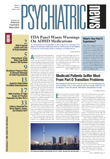One of the first waves of results from the National Institute of Mental Health's (NIMH) Systematic Treatment Enhancement Program for Bipolar Disorder (STEP-BD) suggests that the anticonvulsant/mood stabilizer lamotrigine (Lamictal) may have added value in treating patients with bipolar disorder for resistant depression.
A three-way head-to-head comparison of lamotrigine, risperidone (Risperdal), and inositol as adjunct pharmacotherapy in the treatment of bipolar depression in patients who have not adequately responded to appropriate pharmacotherapy is believed to be the first trial of any medication for treatment-resistant bipolar depression. The results of the small trial appear in the February American Journal of Psychiatry.
“This study was designed back in 1999, and it was felt then that we really didn't know a lot about bipolar depression in general or about treatment-resistant depression in particular,” said lead author Andrew Nierenberg, M.D., an associate professor of psychiatry at Harvard Medical School and Massachusetts General Hospital.
STEP-BD was designed to include two randomized, controlled trials, one looking at the treatment of acute depression (results of which should be published in the next year) and this “smaller study of refractory depression,” Nierenberg told Psychiatric News.
At that time, lamotrigine had yet to be approved by the FDA for maintenance treatment of bipolar I disorder. An anticonvulsant/mood stabilizer, lamotrigine is currently indicated to “delay the time to occurrence of mood episodes (depression, mania, hypomania, mixed episodes) in patients treated for acute mood episodes with standard therapy.”
While the efficacy of lamotrigine has not been established for the acute treatment of mood episodes, a growing body of evidence indicates that the drug may be particularly useful in treating depressive episodes associated with bipolar disorder.
Nierenberg and his STEP-BD co-investigators looked at a subset of 66 of the nearly 4,500 patients enrolled in the larger study (see article above). Participants in the head-to-head trial were patients with bipolar I or II and were in a current major depressive episode that was not responsive to a combination of adequate doses of established mood stabilizers plus at least one antidepressant.
Patients were randomly assigned to open-label treatment with lamotrigine, inositol, or risperidone for up to 16 weeks in addition to their existing mood stabilizer and antidepressant therapy. The primary outcome measure was the rate of recovery, with recovery defined as “no more than two symptoms meeting DSM-IV threshold criteria for a mood episode and no significant symptoms present for eight weeks.”
Nierenberg and his colleagues found no statistically significant differences between the rates of recovery of any two drugs compared (lamotrigine versus risperidone, lamotrigine versus inositol, and inositol versus risperidone). Nierenberg told Psychiatric News this is likely due to the small number of patients in each comparison. For example, in the comparison of lamotrigine and inositol, only six patients were taking lamotrigine compared with 11 patients taking inositol. The number of patients in the other two paired comparisons were similar (15 on lamotrigine and 16 on inositol; 13 on risperidone and eight on inositol).
However, using the same rigorous definition of sustained response for eight weeks, secondary outcomes—in which all patients taking lamotrigine (n=21), inositol (n=23), and risperidone (n=22) were considered—recovery rates were different between the three groups. The overall recovery rates were 23.8 percent for those taking lamotrigine, 17.4 percent for those taking inositol, and 4.6 percent for those taking risperidone; these medications were taken in addition to the patients' existing pharmacotherapy.
“This study suggests, but by no means proves, that risperidone didn't look particularly helpful,” Nierenberg told Psychiatric News.“ However, that would have to be looked at much more closely in a larger study. Perhaps there was a role for inositol, and perhaps there was really a role for lamotrigine.”
Am J Psychiatry 2005 163 210
